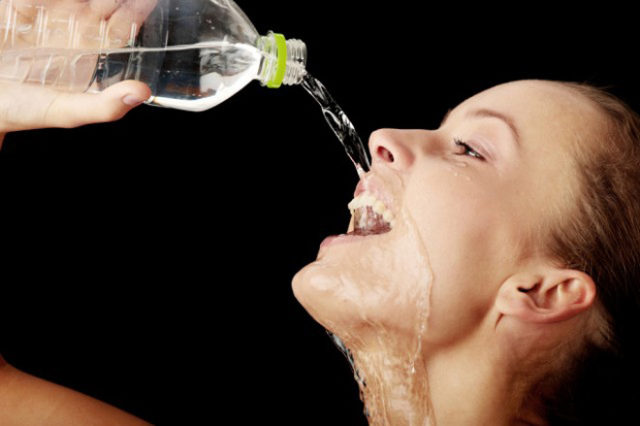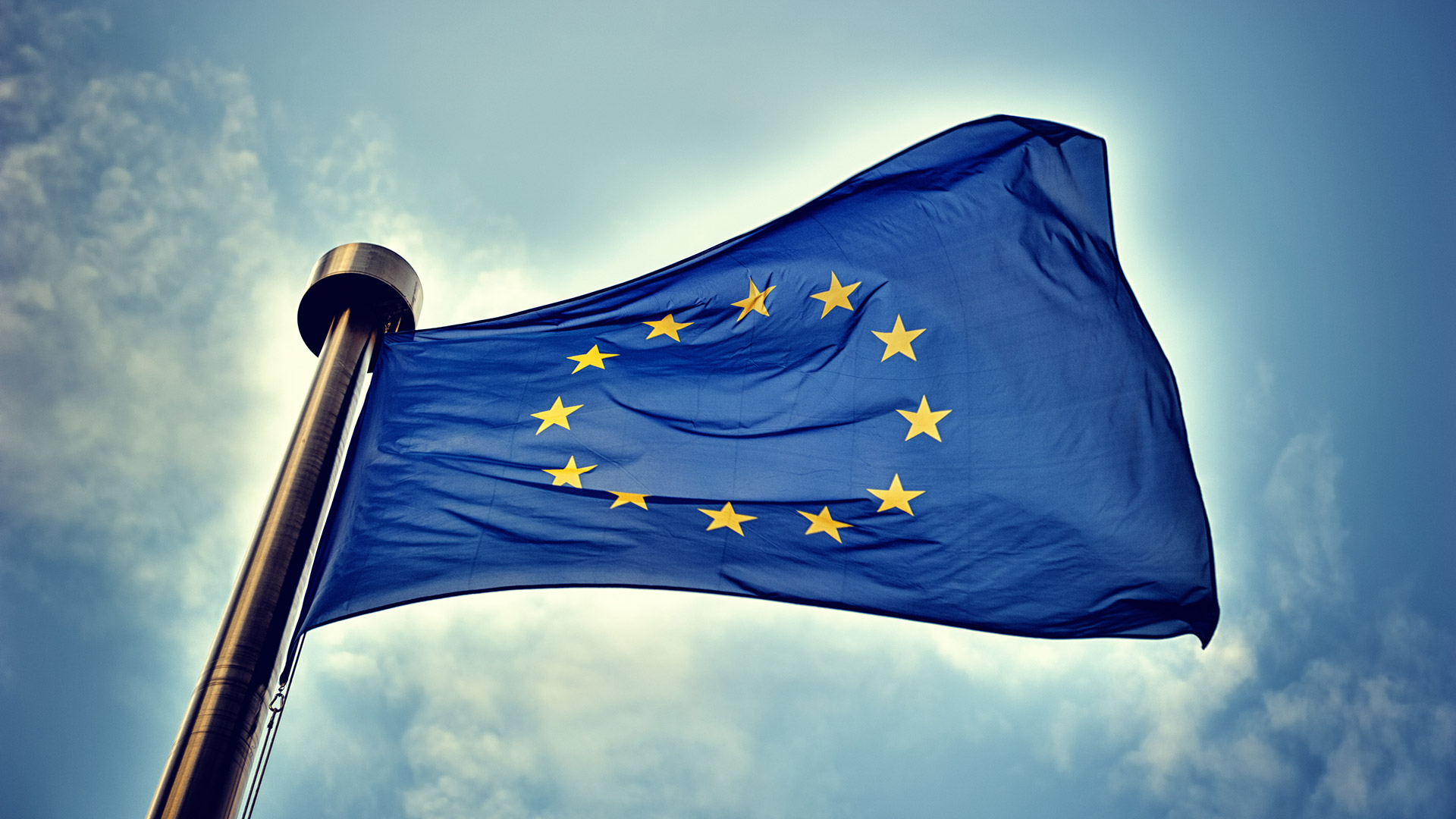If you’re wondering why British people would want to leave the EU, just look at this choice example of bureaucratic stupidity.
Brussels bureaucrats were ridiculed yesterday after banning drink manufacturers from claiming that water can prevent dehydration.
(Telegraph) EU officials concluded that, following a three-year investigation, there was no evidence to prove the previously undisputed fact that water helps prevent dehydration.
Producers of bottled water are now forbidden by law from making the claim and will face a two-year jail sentence if they defy the edict, which comes into force in the UK next month.
Last night, critics claimed the EU was at odds with both science and common sense. Conservative MEP Roger Helmer said: “This is stupidity writ large.
“The euro is burning, the EU is falling apart and yet here they are: highly-paid, highly-pensioned officials worrying about the obvious qualities of water and trying to deny us the right to say what is patently true.
“If ever there were an episode which demonstrates the folly of the great European project then this is it.”
NHS health guidelines state clearly that drinking water helps avoid dehydration, and that Britons should drink at least 1.2 litres per day.
The Department for Health disputed the wisdom of the new law. A spokesman said: “Of course water hydrates. While we support the EU in preventing false claims about products, we need to exercise common sense as far as possible.”
German professors Dr Andreas Hahn and Dr Moritz Hagenmeyer, who advise food manufacturers on how to advertise their products, asked the European Commission if the claim could be made on labels.
They compiled what they assumed was an uncontroversial statement in order to test new laws which allow products to claim they can reduce the risk of disease, subject to EU approval.
They applied for the right to state that “regular consumption of significant amounts of water can reduce the risk of development of dehydration” as well as preventing a decrease in performance.
However, last February, the European Food Standards Authority (EFSA) refused to approve the statement.
A meeting of 21 scientists in Parma, Italy, concluded that reduced water content in the body was a symptom of dehydration and not something that drinking water could subsequently control.
Now the EFSA verdict has been turned into an EU directive which was issued on Wednesday.
Ukip MEP Paul Nuttall said the ruling made the “bendy banana law” look “positively sane”.
He said: “I had to read this four or five times before I believed it. It is a perfect example of what Brussels does best. Spend three years, with 20 separate pieces of correspondence before summoning 21 professors to Parma where they decide with great solemnity that drinking water cannot be sold as a way to combat dehydration.
“Then they make this judgment law and make it clear that if anybody dares sell water claiming that it is effective against dehydration they could get into serious legal bother.
EU regulations, which aim to uphold food standards across member states, are frequently criticised.
Rules banning bent bananas and curved cucumbers were scrapped in 2008 after causing international ridicule.
Prof Hahn, from the Institute for Food Science and Human Nutrition at Hanover Leibniz University, said the European Commission had made another mistake with its latest ruling.
“What is our reaction to the outcome? Let us put it this way: We are neither surprised nor delighted.
“The European Commission is wrong; it should have authorised the claim. That should be more than clear to anyone who has consumed water in the past, and who has not? We fear there is something wrong in the state of Europe.”
Prof Brian Ratcliffe, spokesman for the Nutrition Society, said dehydration was usually caused by a clinical condition and that one could remain adequately hydrated without drinking water.
He said: “The EU is saying that this does not reduce the risk of dehydration and that is correct.
“This claim is trying to imply that there is something special about bottled water which is not a reasonable claim.”
Tell us in the comments section what you think









I think I just lost IQ points reading this!
You probably didn’t have many to play with in the first place if you accepted this story at face value without checking the facts first.
the fact is the story is true. it’s old (2011) but definitely true… so WTF are u on about?
“The regular consumption of significant amounts of water can reduce the risk of development of dehydration and of concomitant decrease of performance”
That is the specific wording of the study.
People actually spent money researching this? It seems that you, Quinn, are the one missing the point.
congrats, you just resurrected a piece of FUD from 5 years ago that wasn’t fully correct that time either. http://www.theguardian.com/science/the-lay-scientist/2011/nov/18/1
I think that you should have begun, instead of finished, with the real issue: there is no reason why bottled water should be able to claim that it does something special in relation with dehydration when medical experts agree that it’s not even necessary to drink water to stay hydrated if you eat varied food (you can check the percentages of body liquids we gain from foods alone). By analogy, food producers could claim that “our product makes you less hungry”, implying that it diminishes your appetite in the long run, that it prevents you from getting hungry. Now imagine someone making a big fuzz about not being allowed to say that eating makes you less hungry. But if you had started with the fact of the matter, rather than your politically motivated tirade about bureaucracy, it would have been a much shorter piece. Or it would not even have existed, because no-one really cares about what the labels on bottled waters claim or not, except the very small set of people employed by the European Union whose job it is to look out for our common main interests by holding back fraudulent (or unnecessary) claims. It might even have been as short of a message as “The European Union legislates fraudulent advertising. Good.”
Hydro = water.
Hydration = ‘watering’ your body
Water hydrates. Water waters.
Drinking water prevents hydration. =) arrest me
This news is from 5 years ago. It made the circles through a few new sources that did not bothered fact checking. It stopped on its tracks as soon as people realized that they were mischaracterizing what happened. Yet another example of the importance of inquiry and skepticism. Do not believe everything you read and check your sources.
I searched, but could not find the actual text of any such ban leading to jail time on actual EU law. Granted, that could just mean the EU website is not accurate. But it is particularly interesting that first surfaced 5 years ago when the UK was throwing another fit. Now, 5 years later, another random set of websites seeking to capitalize on clicks of people interested in Brexit topics recycles the same news with obvious cross-website plagiarism without even bothering to mention it is an old occurrence. That is irresponsible journalism, if you can even call it that. Even the original publications were naïve. Another example of why you need to check primary sources for information.
Around the same time the news originally was posted, Forbes did an article on it that said:
“ In 2008, German scientists Dr Andreas Hahn and Dr Moritz Hagenmeyer submitted an application to the European Food Safety Authority (EFSA) requesting the right to make the claim ”regular consumption of significant amounts of water can reduce the risk of development of dehydration and of concomitant decrease of performance” on labels of bottled water.”
Notice that this supposedly started with a request made by German scientists. But would be good reasons for the EU to launch an inquiry and eventually say no, if it indeed happened. Most of the reasons go back to protecting the public from being mislead by advertisements that would lead them to learn incorrect information.
1) First that the recommendation uses language that is meaningless in terms of communicating usefulness of product when it says water CAN help reduce… Allowing that kind of language would set the precedent for anyone to sell products that CAN possibly do anything. For example, McDonalds could market their burgers saying you CAN loose weight eating them. A lot of things are possible given a lot of other factors. Possibility is less important than probability. Also, if they allowed this to be printed in water, since we also get substantial amount of water from foods, food companies could make the same claim. Worse, beer and soda companies to make the same claims. This could open the flood gates (pun intended) to a series of public health issues. Politics are more than just about facts / truth. They are also about consequences. It is not strange, considering what I just said, that they should make that decision.
2) Like I said above, there are other sources of water. In fact, you can do this experiment (although I do not recommend it). If you eat normally, but do drink all day, you will still go to the bathroom, albeit less. If you eat fruits and vegetables a lot, you can actually pee with normal color. Naturally, water helps you stay hydrated, flush toxins, etc. There are countless benefits to drinking water that have been studied and published in peer-reviewed articles. No one questions that drinking water is healthy. But that is actually not what the scientists claims were about. See more below.
3) The scientists were not referring to dehydration of the the kind you get when you stay in the sun or exercise without drinking water. This is what most people think when they first see the post and do not bother researching enough and thinking about it. But what this is really about is an attempt to sell water bottles by telling people drinking water serves as a preventive for health problems that LEAD to dehydration. Now that is a completely different story. Such types of physiological conditions leading to symptoms of dehydration are not prevented by drinking habits. For example, as you age, your skin loses water and tone. Even if you drink water regularly, you will not prevent that. Furthermore, the scientist that met in Parma after concluding their experiments, were working on determining that this was also true for several other physiological conditions for which dehydration is a symptom. When dehydration of that kind happens, drinking water is especially important to stay alive, but that does not mean good drinking methods would have preventing you from developing the physiological or metabolic condition that caused the symptoms. It is sensible that the EU ordered such analysis before making a decision because it would be pretty cool if drinking water saved you from these things: http://www.medicinenet.com/…/related-conditions/index.htm. The same go for the decreased performance associated with the conditions, also mentioned in the quote, which mind you is never defined (what is performance in this context)?
4) There is also a problem with the word “substantial”. Research indicates that drinking too much water over a short period of time can lead to hyponatremia and other water intoxication problems associated with loss of electrolyte balance, which actually decreases performance.
5) You have to be honest with yourself. They were trying to sell water bottles. They use the words “substancial” and “performance” and “prevent” a disease. The EU already has problems with the ecological impact of plastic bottles. Add to it the bad language and bad science, they could not resist. But if you think about it, they were looking out for the people. Such a ban would not be about prohibiting companies for telling people that water hydrates you (which would indeed be absurd). They correctly prohibited a corporation from hurting people by making them believe water can act as a preventive for conditions that lead to dehydration (which was the intention of the people who asked for it).
So you could say this would be an example of the EU fighting to protect the masses from corporations, which ironically is the reverse idea of the spirit of the posts you have been posting lately.
But what this is also an excellent example of, is that people twist the facts, to serve their needs. Because of the problems with Britain, the story went from: “EU protects people from companies attempting to make false claims about water’s ability to prevent diseases leading to dehydration” to “EU has laws that make no sense. Here is an example of bureaucracy wasting money just to take the most stupid rights away from people” . Even the tone of the article you linked was the scientists asked for the “right” to do it. This is an anti-EU propaganda piece that is old, inaccurate, and actually plagiarized from another website.
By the way, here is the Forbes linked I mentioned: http://www.forbes.com/…/eu-bans-bottled-water-claim…/…
But, I am not even sure this is even real yet (even with the Forbes connection. The article was written by a contributor that may have picked up the story from another site, not an official journalist. Hard to find a primary source on this story).
Do your research. I finally found some primary sources. And prepare for that moment of public embarrassment… Well, at least it is not totally fake. There was indeed a thing about this. But there no special mention of 2 years in prison. So it is a bit of an embarrassment. Well, it could be worse for you if it had not even happened at all.
Also here is the regulation in question: http://eur-lex.europa.eu/legal-content/EN/TXT/HTML/…
This long regulation is really all about preventing false claims to be printed into labels of foods, drugs, and products. Same reason the FDA basically exists in the USA. To protect the public, there are specific directives that must be fulfilled before a company can place a label claiming health benefits. It is naïve to think all of the public would be educated about all drugs, foods, etc. This is why this exists. The penalty, which is not even 2 years (it is usually fines) is not for saying something in advertisement, but saying something without permission of the regulatory commission. If they make exceptions, the flood gates would open and people would be making all sorts of crazy claims (like I said in another post)
Upon closer research I found out that what the scientists filling the claim wanted was to be able to advertise water as a food/drug product that reduce the risk for disease. As per the regulation linked above, any such claims must be submitted to the EU for approval so as to protect the citizens from false advertisements making claims that have not been scientifically tested. The commission determined that water did not qualify because it is by definition not a health product but something that is required for normal functioning. In other words, approving would be like saying: “Oxygen reduces the risk of death by asphyxiation. Breathe more.” It is less that it was not true and more that it did not qualify under the law for a special “health benefit label” when it is more a health requirement in the first place. Furthermore, it was determined that indeed water does NOT prevent all dehydration, as it is often caused by physiological problems that cannot be prevented with water consumption.
They did not mention the other reasons I noted on my first reply, but I still think it makes sense that claims that say a product CAN help are meaningless, and that there are problems with the ideas of improving “performance” (unclear) and drinking “substantial amounts” (too much can be a problem).
Anyhow, this is the EFSA documentation on the recommendation that was made following the study:
https://www.efsa.europa.eu/en/supporting/pub/172e
https://www.efsa.europa.eu/en/efsajournal/pub/1982
https://www.efsa.europa.eu/…/files/main_documents/172e.pdf
This is the text of new regulation posted after the study:
http://eur-lex.europa.eu/legal-content/EN/TXT/HTML/…
But again no specific notion of a 2 year prison term and for valid legal reasons.
Thank you for the thorough take down.
Also enforcement of such laws is up to national governments. Very imortant point.
I think the point is that it sounds very much like George Orwell’s “Animal farm”.
I do not agree, read that: https://theprose.com/post/5212/rig-about-now-i-m-ready-to-shoot-those-speakers-into-silence
Sincerely, Marjorie
Illegal is it? ok then ‘Drinking Water Prevents Dehydration’ so go ahead prosecute me, those people in Brussels are pathetic!
This is about privatization of World water:
Dr. Valerie Hunt :
Valerie Virginia Hunt, Ed.D (July 22, 1916 – February 15, 2014)
“We as human beings are atomic.. we are radiating energy. This energy radiates out, it is the part that creates…it is vibrations.. and WATER is what energizes it”
Global Water Justice Movement challenges World Bank’s attempt to promote privatization of water through UN SDG Agenda https://www.tni.org/en/article/global-water-justice-movement-challenges-world-banks-attempt-to-promote-privatization-of
Water Securitization, Agenda 21 and the Right to Life
https://occupycorporatism.com/water-securitization-agenda-21-and-the-right-to-life/
Dr. Valerie Hunt :
Valerie Virginia Hunt, Ed.D (July 22, 1916 – February 15, 2014)
“We as human beings are atomic.. we are radiating energy. This energy radiates out, it is the part that creates…it is vibrations.. and water is what energizes it”
The difference between us and a rock, is we are made of different atoms. We are unique and separate . This energy is based on primary source. It transacts. Life is a transaction, Unless we have a world
full of energy there would be no life. We are trying to find it on the moon, with water, , but water is what energizes it to become muted , morphed and become greater…..so we need at lot of this outside energy…but what happens here is vibrations.. these vibrations are
higher and lower.. and they become human consciousness ..We are working on the higher fields,,they have worked on the lower
fields..and we as scientists are realizing that what we got are not the actual facts ..the higher energy field of information. .talking micro voltage.. The body’s energy field is different in each person…..”, https://www.youtube.com/watch?v=2MmkshmhNrg
Human aura recordings:
An acclaimed scientist, lecturer and professor, Dr. Valerie V. Hunt’s
research has scientifically verified the human energy field, or the Human Aura which surrounds the entire human body. Dr. Hunt has found that the energy fields correlate directly with pain, emotional and physical experiences, and conditions of health, and that these
frequency variations can be measured and graphically displayed. For the first time, this video shows with pictures, sounds and slides, Dr.
Hunt’s amazing energy field research during health, disease, pain, emotions, imagery, and consciousness states. New concepts of the chaos patterns and coherency of illness, aging, and the energy source of
free radicals encourages energy approaches.
https://www.youtube.com/watch?v=x1B7lFAmhcs&feature=share
its about privatizing WATER:: Elon Musk talks sustainability with Norway Prime Minister (2016.4.21) Published on Apr 21, 2016
Shortly before speaking at the ‘Future transport solutions’ conference in Oslo, Elon Musk chats with Erna Solberg, Norway’s Prime Minister, about how to make the world greener. https://www.youtube.com/watch?v=0pqTHBFDjVc
I think selling bottled water should be banned…most of it is tap water…or ground water that the likes of Nestle just want to profit from…water is a human right and selling it by the bottle is criminal…and water does prevent dehydration…drink at least 1.2 litres per day…
You don’t have a “right” to anything